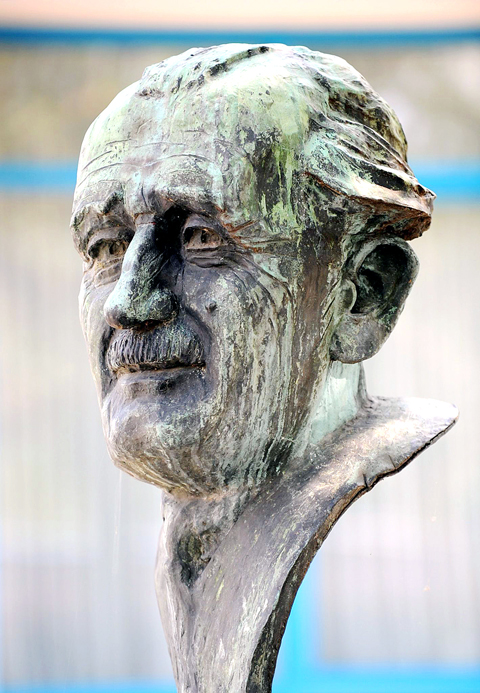Volkswagen, Europe’s biggest carmaker, and luxury auto manufacturer Porsche said on Thursday they had approved a plan to merge by 2011 and create an auto giant.
Volkswagen chief executive Martin Winterkorn becomes head of both Porsche and VW after the agreement to tie up the companies, announced by the firms’ supervisory boards.
“We have more than ever the means [to become] No. 1 in the automotive industry,” he said.

PHOTO: EPA
The merger of the car giants draws a line under a four-year battle marked by multiple twists and turns, family feuds and boardroom battles.
It marks a clear victory for VW chairman Ferdinand Piech, nicknamed “the patriarch” by German media, and the failure of Porsche’s bid to take over their far larger rivals.
Under the terms of the agreement, Volkswagen will initially buy a 42-percent stake in Porsche by the end of next year for 3.3 billion euros (US$4.7 billion), a deal that values Porsche at 12.4 billion euros, the companies said.
Volkswagen will then increase its capital in the first six months of next year by issuing new preferred shares, and Porsche will issue ordinary and preferred shares in the first half of 2011 by.
The merger deal comes after months of complex and acrimonious negotiations.
Volkswagen eked out a net profit in the second quarter despite a collapse in demand for cars because of the global economic crisis and it plans to become the world’s biggest automaker by 2018 by overtaking Japan’s Toyota.
VW’s teaming up with Porsche may bring it a step closer to this goal, as the carmaker strengthens its position as top European manufacturer, with more than 400,000 employees worldwide and an annual production of 6.4 million cars.
The group will now work to integrate Porsche as its 10th brand, alongside the Audi, Bentley, Bugatti and Lamborghini, although the companies stressed on Thursday that Porsche would remain an “independent” brand.
“The autonomy of Porsche will be guaranteed in the integrated group,” Volkswagen said in a statement.
Porsche’s supervisory board said Winterkorn would become its new chief executive while remaining boss at VW, a post he has held since 2007.
In addition, Volkswagen chief financial officer Hans Dieter Poetsch takes up the same role at Porsche.
There were no further details of the role to be played by the Gulf state of Qatar.
Winterkorn had previously announced Qatar would take a direct 17-percent stake in VW by acquiring stock options owned by Porsche.
Negotiations with Qatar would continue, Volkswagen said on Thursday.
Winterkorn said the “integrated group” would give Porsche “new opportunities for growth.”
The plan seals the failure of a gamble begun by Porsche’s management last year to take over the far larger VW in what would have been one of the most spectacular corporate operations in German history.
The deal also marks a victory for VW chairman Piech, grandson of the inventor of the VW Beetle, who has been planning the tie-up with Porsche for years.

MORE VISITORS: The Tourism Administration said that it is seeing positive prospects in its efforts to expand the tourism market in North America and Europe Taiwan has been ranked as the cheapest place in the world to travel to this year, based on a list recommended by NerdWallet. The San Francisco-based personal finance company said that Taiwan topped the list of 16 nations it chose for budget travelers because US tourists do not need visas and travelers can easily have a good meal for less than US$10. A bus ride in Taipei costs just under US$0.50, while subway rides start at US$0.60, the firm said, adding that public transportation in Taiwan is easy to navigate. The firm also called Taiwan a “food lover’s paradise,” citing inexpensive breakfast stalls

TRADE: A mandatory declaration of origin for manufactured goods bound for the US is to take effect on May 7 to block China from exploiting Taiwan’s trade channels All products manufactured in Taiwan and exported to the US must include a signed declaration of origin starting on May 7, the Bureau of Foreign Trade announced yesterday. US President Donald Trump on April 2 imposed a 32 percent tariff on imports from Taiwan, but one week later announced a 90-day pause on its implementation. However, a universal 10 percent tariff was immediately applied to most imports from around the world. On April 12, the Trump administration further exempted computers, smartphones and semiconductors from the new tariffs. In response, President William Lai’s (賴清德) administration has introduced a series of countermeasures to support affected

CROSS-STRAIT: The vast majority of Taiwanese support maintaining the ‘status quo,’ while concern is rising about Beijing’s influence operations More than eight out of 10 Taiwanese reject Beijing’s “one country, two systems” framework for cross-strait relations, according to a survey released by the Mainland Affairs Council (MAC) on Thursday. The MAC’s latest quarterly survey found that 84.4 percent of respondents opposed Beijing’s “one country, two systems” formula for handling cross-strait relations — a figure consistent with past polling. Over the past three years, opposition to the framework has remained high, ranging from a low of 83.6 percent in April 2023 to a peak of 89.6 percent in April last year. In the most recent poll, 82.5 percent also rejected China’s

PLUGGING HOLES: The amendments would bring the legislation in line with systems found in other countries such as Japan and the US, Legislator Chen Kuan-ting said Democratic Progressive Party (DPP) Legislator Chen Kuan-ting (陳冠廷) has proposed amending national security legislation amid a spate of espionage cases. Potential gaps in security vetting procedures for personnel with access to sensitive information prompted him to propose the amendments, which would introduce changes to Article 14 of the Classified National Security Information Protection Act (國家機密保護法), Chen said yesterday. The proposal, which aims to enhance interagency vetting procedures and reduce the risk of classified information leaks, would establish a comprehensive security clearance system in Taiwan, he said. The amendment would require character and loyalty checks for civil servants and intelligence personnel prior to